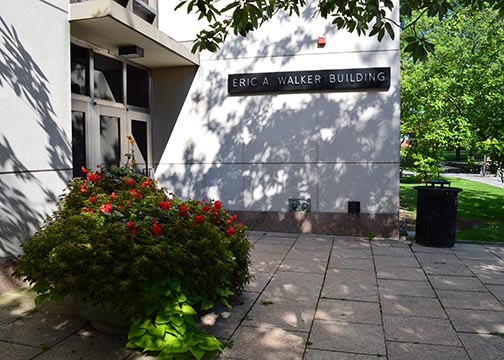IMAGE OF THE WEEK
Entrance to the Walker Building at the start of the fall semester. Classes began August 25, 2014. Send your photos from fieldwork and travels to geography@psu.edu
GOOD NEWS
New job, promotion, award, graduation, wedding, baby? Send your good news to share to geography@psu.edu
NEWS
August 29 Coffee Hour: Kirby Calvert “Mapping Energy Futures”
- 3:30 to 5:00 p.m.
- Refreshments are offered in 319 Walker Building at 3:30 p.m.
- The lecture begins in 112 Walker Building at 4:00 p.m.
- Coffee Hour To Go
In principal, the transition toward a low carbon and renewable energy system is a positive change toward a sustainable future. In practice, the large-scale implementation of renewable energy (RE) production systems brings new demands to local land-based economic activities and ecosystem services as well as unfamiliar opportunities and challenges to households, communities, planners, and policy-makers. In other words, the transition to RE resources is necessarily disruptive to prevailing socio-ecological systems and is in some cases (perceived to be) socially and environmentally regressive.
Next Week: Tess Russo “Groundwater Depletion in the United States …”
Fall 2014 Coffee Hour Schedule
Anyone can sign up for Geog-Coffee-Hour-L@lists.psu.edu for a Friday morning announcement about the upcoming lectures.
The Undergraduate Research Opportunities Connection (UROC) deadlines
UROC allows undergraduate students to gain valuable research experience and technical skills through collaboration on projects within the department and supervised by faculty and/or graduate students, as well as 1-3 credit hours to apply towards graduation. This is a valuable resume-building experience for undergraduate students and can be beneficial for both future employment and graduate school.
Upcoming deadlines:
- For graduate students to submit new projects: October 30, 2014
- For undergraduate students to apply: November 17, 2014 (5:00 p.m.)
- For graduate students to notify accepted undergrads: December 8, 2014 (5:00 p.m.)
Bad Latitudes Intramural Soccer
The Bad Latitudes will once again be fielding a co-rec soccer team this fall. All students, faculty and staff are encouraged to join, and any skill level is welcome.
If you think that you might be interested in playing, or have any further questions, contact Jase Bernhardt: jeb5249@psu.edu
Recently Published
Chlorophyll increases off the coasts of Japan after the 2011 tsunami using NASA/MODIS data
By Elena Sava, B. Edwards, and Guido Cervone
In Natural Hazards and Earth System Sciences
Large chlorophyll anomalies are observed after the 2011 Japanese tsunami using the NASA MODIS instrument onboard the TERRA and AQUA satellites. These anomalies are observed both along the eastern coast of Japan, where the tsunami wave hit with maximum force, and in the deep water surrounding the epicentral region. Although both satellites show agreeing spatio-temporal patterns, larger anomalies are detected using the AQUA satellite. A temporal analysis shows increased chlorophyll concentrations immediately after the tsunami, and higher values are observed for nearly one month before reversing to pre-tsunami levels.
Variable adaptations: Micro-politics of environmental displacement in the Okavango Delta, Botswana
By Jamie E. Shinn, Brian King, Kenneth R. Young, Kelley A. Crews
In Geoforum
Increasing environmental variability associated with global climate change is expected to produce social instability and human displacement in future decades. As such, there remains a pressing need to understand the implications of environmental changes for human populations and their adaptive capacities. This paper analyzes governmental and intra-community responses to environmental variability through a case study from the Okavango Delta, Botswana. We report findings from fieldwork conducted during May–June 2011 and October 2012–May 2013 in the village of Etsha 13. Following an increase in annual flooding in 2009, 2010, and 2011, the Government of Botswana permanently relocated hundreds of residents to a nearby dryland area, asserting that this new settlement was necessary to reduce future risks from flooding variability. While some residents accepted this position, others elected to return to the floodplain or to illegally divert the flow of the water to protect their homes. This paper explores the micro-politics of these relocation efforts and competing responses in order to examine differential adaptive responses to increased flooding levels. We situate these findings within the burgeoning literature on transformative adaptation and suggest that micro-political dynamics are critical in shaping the limitations to, and possibilities for, effective adaptive responses to global environmental change.
Glacier melting linked more closely with burning of fossil fuels
Humans are playing a larger and larger role in the increasingly rapid disappearance of glaciers around the world and nowhere is the evidence clearer than in Western Canada, says newly-published research.
“It’s another nail in the coffin of the idea that we’re not blame,” said Graham Cogley, a Trent University geographer, who has co-authored research that appeared this month in the journal Science.
Why do so many Americans deny climate change?
Are you puzzled by American attitudes on climate change? Within the international climate change community, U.S. policy has been met with a mix of hope and frustration. Following the release of the U.S. national assessment report on the heels of the IPCC fifth assessment, the characterization of climate change appears to be shifting in American public discourse. What was previously “a series of impacts that will only be felt in the distant future,” is increasingly described as something that is already happening. Even politicians that in the past eagerly denied global warming, have begun to moderate their challenges of climate science, with some now avoiding comment altogether on grounds they are “not qualified to talk about it.”
DOG OF THE WEEK
Last week’s mystery dog was Ben, belonging to Deryck Holdsworth and Susan Friedman. Barbara Luther was the first to respond with the correct answer.
Send your answer to geography@psu.edu along with a photo of your dog for our mystery dog of the week!


